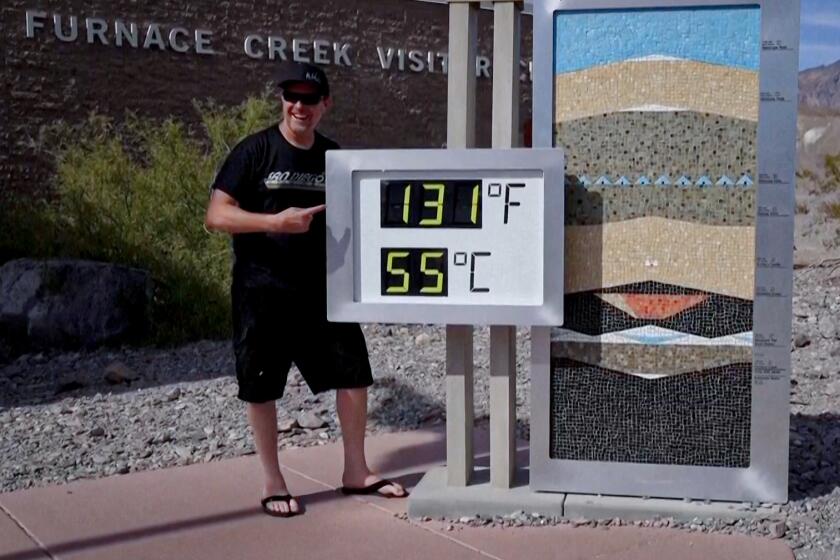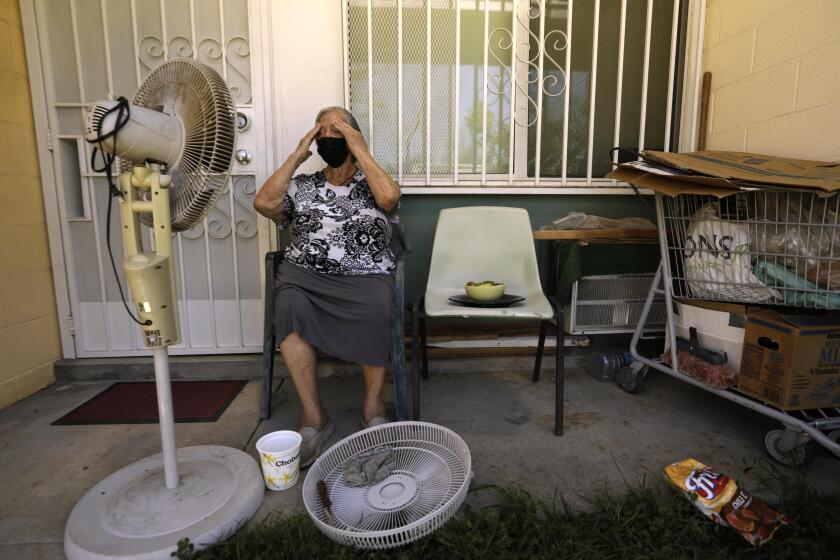Tourists and residents warned to stay inside as deadly heat hits Europe during peak travel season

- Share via
MILAN, Italy — Officials warned residents and tourists packing Mediterranean destinations Tuesday to stay indoors during the hottest hours as the second heat wave in two weeks hit the region and Greece, Spain and Switzerland battled wildfires.
In Italy, civil protection workers monitored crowds for people in distress from the heat in central Rome, while Red Cross teams in Portugal took to social media to warn people not to leave pets or children in parked cars. In Greece, volunteers handed out drinking water, and in Spain, they reminded people to protect themselves from breathing in smoke from fires.
“Heat waves are really an invisible killer,” Panu Saaristo, emergency health unit leader for the International Federation of Red Cross and Red Crescent Societies, said at a briefing in Geneva. “We are experiencing hotter and hotter temperatures for longer stretches of time every single summer here in Europe.”
The new heat wave in several parts of Southern Europe is expected to persist for days. The United Nations weather agency said that temperatures in Europe, intensified by climate change, could break the record of nearly 120 degrees Fahrenheit set in Sicily two years ago.
As concerns grew that the extreme heat would cause a spike in deaths, civil protection volunteers distributed reusable water bottles at 28 popular spots in Rome. Authorities also encouraged visitors and residents to take advantage of the Italian capital’s distinctive public drinking fountains, hundreds of which are located in the city’s historic center alone.
Fausto Alberetto, who was visiting Rome from Northern Italy’s Piedmont region Tuesday, asked some volunteers how to use an app to find the closest “nasone.” Reading about the heat wave before his trip did little to prepare him for the reality of Rome’s 104-degree temperatures, he said.
Phoenix smashed a record for major U.S. cities Tuesday, the 19th consecutive day that the temperature reached 110 degrees.
“We got information and we were prepared. But it is one thing to hear it or read it; it is another thing to feel it,″ Alberetto said as he walked near Piazza Venezia in the heart of Rome. ”Here it is really dreadful.”
Volunteers identified four people deemed to be suffering from the heat, but none of them was in serious condition, according to Giuseppe Napolitano, Rome’s civil protection director.
In Cyprus, health authorities confirmed that a 90-year-old man died over the weekend and six other adults were hospitalized after all seven suffered heatstroke at home last week as temperatures surpassed 110 degrees.
Heat records are being shattered all over the world, and scientists say there is a good chance that 2023 will go down as the hottest year on record, according to measurements going back to the middle of the 19th century.
Death Valley temperatures soared to 128 degrees Sunday, breaking the daily record of 127 degrees set in 2005 and 1972. It was expected to hit 125 on Monday.
Preliminary figures suggest the global average temperature last month set a June record, according to the European Union’s Copernicus Climate Change Service. The World Meteorological Organization predicted that a number of heat records were set to fall this summer. The U.N. weather agency said unprecedented sea surface temperatures and low Arctic sea-ice levels were largely to blame.
Human-caused climate change from the burning of coal, oil and natural gas is making the world hotter and is being amplified by the naturally occurring El Niño weather phenomenon. But the current El Niño started only a few months ago and is still weak-to-moderate and isn’t expected to peak until winter.
Temperatures above 104 degrees were forecast to persist not only in the Mediterranean, but across North America, Asia and North Africa.
“These are not your normal weather systems of the past. They have arrived as a consequence of climate change,” said John Nairn, senior extreme heat advisor for the World Meteorological Organization. “It is global warming, and it’s going to continue for some time.”
With Earth breaking average heat records, L.A. and other cities face a test of their readiness plans for temperatures that can kill.
Nairn noted a sixfold increase in simultaneous heat waves since the 1980s, “and the trend line isn’t changing.”
A relentless summer last year saw Europe sweat through heat wave after heat wave, resulting in 61,000 heat-related deaths, scientists estimate. In 2019, as the world experienced its hottest July on record, the continent also sweltered, with even towns above the Arctic Circle reaching new scorching highs.
Spain and Portugal had their temperature records shattered in 2018 when a mass of hot air moved up from Africa, igniting forest fires in the Iberian Peninsula.
The idea that hot weather could be a killer, not just an inconvenience, was impressed on much of Europe by a deadly 2003 heat wave.
Record heat. Raging fires. What are the solutions?
Get Boiling Point, our newsletter about climate change, the environment and building a more sustainable California.
You may occasionally receive promotional content from the Los Angeles Times.
France, the most-affected country that year, had about 15,000 heat-related deaths, many of them of older people in city apartments and retirement homes without air conditioning. The deaths prompted the country to introduce a warning system and reassess how it deals with extreme temperatures.
Other countries are taking steps to protect the public during the sweltering summer of 2023.
In Greece, authorities last week introduced changes in working hours and ordered afternoon closures of the Acropolis and other ancient sites to allow workers to cope with the high heat. A second heat wave is expected to hit Thursday, and temperatures as high as 111 degrees are expected in parts of central and southern Greece by the end of the week.
Three large wildfires burned outside Athens for a second day. Thousands of people who were evacuated from coastal areas south of the capital returned to their homes Tuesday when a fire finally receded. They had spent the night on beaches and in hotels and public facilities.
Parts of Southern California could experience triple-digit temperatures in this heat wave. Here are some tips to beat the heat without air conditioning.
Most of Spain is under alert for high-to-extreme heat, with forecasts calling for peak temperatures of 109 degrees in areas along the Ebro River in the northeast and on the island of Mallorca. Spain is also dealing with a prolonged drought that has increased concerns about the risk of wildfires.
Some 400 firefighters, assisted by nine water-dumping aircraft, labored to extinguish a wildfire that burned for a fourth consecutive day on La Palma in Spain’s Canary Islands. Authorities said that a perimeter has been established around the blaze but that it is still active.
In Switzerland, some 150 firefighters, police, troops and other emergency teams backed by helicopters fanned out Tuesday to fight a wildfire that engulfed a mountainside in the southwestern Wallis region, evacuating residents of four villages and hamlets in the area.
More to Read
Sign up for Essential California
The most important California stories and recommendations in your inbox every morning.
You may occasionally receive promotional content from the Los Angeles Times.















